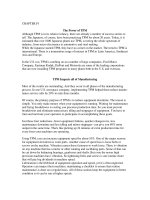Tài liệu The Power of Talk: Who Gets Heard and Why pptx
Bạn đang xem bản rút gọn của tài liệu. Xem và tải ngay bản đầy đủ của tài liệu tại đây (489.3 KB, 12 trang )
The Power of Talk:
Who Gets Heard
and Why
by Deborah Tannen
Reprint 95510
Harvard Business Review
reasonable approach. But my field of research, socio-
linguistics, suggests otherwise. The CEO obviously
thinks he knows what a confident person sounds
like. But his judgment, which may be dead right for
some people, may be dead wrong for others.
Communication isn’t as simple as saying what
you mean. How you say what you mean is crucial,
and differs from one person to the next, because us-
ing language is learned social behavior: How we
talk and listen are deeply influenced by cultural ex-
perience. Although we might think that our ways
of saying what we mean are natural, we can run
into trouble if we interpret and evaluate others as
if they necessarily felt the same way we’d feel if we
spoke the way they did.
Since 1974, I have been researching the influence
of linguistic style on conversations and human re-
Copyright © 1995 by the President and Fellows of Harvard College. All rights reserved. PHOTOS BY CHRISTOPHER MAKOS
Deborah Tannen is University Professor and a professor
of linguistics at Georgetown University in Washington,
D.C. She is the author of 15 books, including You Just
Don’t Understand: Women and Men in Conversation
(William Morrow, 1990), which introduced to the gen-
eral public the idea of female and male styles of com-
munication. The material in this article is drawn from
Talking from 9 to 5 (Avon Books, 1995).
The Power of Talk:
The head of a large division of a multinational
corporation was running a meeting devoted to per-
formance assessment. Each senior manager stood
up, reviewed the individuals in his group, and eval-
uated them for promotion. Although there were
women in every group, not one of them made the
cut. One after another, each manager declared, in
effect, that every woman in his group didn’t have
the self-confidence needed to be promoted. The di-
vision head began to doubt his ears. How could it be
that all the talented women in the division suffered
from a lack of self-confidence?
In all likelihood, they didn’t. Consider the many
women who have left large corporations to start
their own businesses, obviously exhibiting enough
confidence to succeed on their own. Judgments
about confidence can be inferred only from the way
people present themselves, and much of that pre-
sentation is in the form of talk.
The CEO of a major corporation told me that he
often has to make decisions in five minutes about
matters on which others may have worked five
months. He said he uses this rule: If the person
making the proposal seems confident, the CEO ap-
proves it. If not, he says no. This might seem like a
by Deborah Tannen
Who Gets Heard and Why
lationships. In the past four years, I have extended
that research to the workplace, where I have ob-
served how ways of speaking learned in childhood
affect judgments of competence and confidence, as
well as who gets heard, who gets credit, and what
gets done.
The division head who was dumbfounded to hear
that all the talented women in his organization
lacked confidence was probably right to be skepti-
cal. The senior managers were judging the women
in their groups by their own linguistic norms, but
women – like people who have grown up in a differ-
ent culture – have often learned different styles of
speaking than men, which can make them seem
less competent and self-assured than they are.
What Is Linguistic Style?
Everything that is said must be said in a certain
way – in a certain tone of voice, at a certain rate
of speed, and with a certain degree of loudness.
Whereas often we consciously consider what to say
before speaking, we rarely think about how to say
it, unless the situation is obviously loaded – for ex-
ample, a job interview or a tricky performance re-
view. Linguistic style refers to a person’s character-
istic speaking pattern. It includes such features as
directness or indirectness, pacing and pausing,
word choice, and the use of such elements as jokes,
figures of speech, stories, questions, and apologies.
In other words, linguistic style is a set of culturally
learned signals by which we not only communicate
what we mean but also interpret others’ meaning
and evaluate one another as people.
Consider turn taking, one element of linguistic
style. Conversation is an enterprise in which peo-
ple take turns: One person speaks, then the other
responds. However, this apparently simple ex-
change requires a subtle negotiation of signals so
that you know when the other person is finished
and it’s your turn to begin. Cultural factors such as
country or region of origin and ethnic background
influence how long a pause seems natural. When
Bob, who is from Detroit, has a conversation with
his colleague Joe, from New York City, it’s hard for
him to get a word in edgewise because he expects a
slightly longer pause between turns than Joe does.
A pause of that length never comes because, before
it has a chance to, Joe senses an uncomfortable si-
lence, which he fills with more talk of his own.
HARVARD BUSINESS REVIEW September-October 1995
139
We all know what confidence, competence,
and authority sound like. Or do we?
Both men fail to realize that differences in conver-
sational style are getting in their way. Bob thinks
that Joe is pushy and uninterested in what he has
to say, and Joe thinks that Bob doesn’t have much to
contribute. Similarly, when Sally relocated from
Texas to Washington, D.C., she kept searching for
the right time to break in during staff meetings –
and never found it. Although in Texas she was con-
sidered outgoing and confident, in Washington she
was perceived as shy and retiring. Her boss even
suggested she take an assertiveness training course.
Thus slight differences in conversational style – in
these cases, a few seconds of pause – can have a sur-
prising impact on who gets heard and on the judg-
ments, including psychological ones, that are made
about people and their abilities.
Every utterance functions on two levels. We’re
all familiar with the first one: Language communi-
cates ideas. The second level is mostly invisible to
us, but it plays a powerful role in communication.
As a form of social behavior, language also negoti-
ates relationships. Through ways of speaking, we
signal – and create – the relative status of speakers
and their level of rapport. If you say, “Sit down!”
you are signaling that you have higher status than
the person you are addressing, that you are so close
to each other that you can drop all pleasantries, or
that you are angry. If you say, “I would be honored
if you would sit down,” you are signaling great
respect – or great sarcasm, depending on your tone
of voice, the situation, and what you both know
about how close you really are. If you say, “You
must be so tired – why don’t you sit down,” you are
communicating either closeness and concern or
condescension. Each of these ways of saying “the
same thing” – telling someone to sit down – can
have a vastly different meaning.
In every community known to linguists, the pat-
terns that constitute linguistic style are relatively
different for men and women. What’s “natural” for
most men speaking a given language is, in some
cases, different from what’s “natural” for most
women. That is because we learn ways of speaking
as children growing up, especially from peers, and
children tend to play with other children of the
same sex. The research of sociologists, anthropolo-
gists, and psychologists observing American chil-
dren at play has shown that, although both girls and
boys find ways of creating rapport and negotiating
status, girls tend to learn conversational rituals
that focus on the rapport dimension of relation-
ships whereas boys tend to learn rituals that focus
on the status dimension.
Girls tend to play with a single best friend or in
small groups, and they spend a lot of time talking.
They use language to negotiate how close they are;
for example, the girl you tell your secrets to be-
comes your best friend. Girls learn to downplay
ways in which one is better than the others and to
emphasize ways in which they are all the same.
From childhood, most girls learn that sounding too
sure of themselves will make them unpopular with
their peers – although nobody really takes such
modesty literally. A group of girls will ostracize a
girl who calls attention to her own superiority and
criticize her by saying, “She thinks she’s some-
thing”; and a girl who tells others what to do is
called “bossy.” Thus girls learn to talk in ways that
balance their own needs with those of others – to
save face for one another in the broadest sense of
the term.
Boys tend to play very differently. They usually
play in larger groups in which more boys can be in-
cluded, but not everyone is treated as an equal. Boys
with high status in their group are expected to em-
phasize rather than downplay their status, and usu-
ally one or several boys will be seen as the leader or
leaders. Boys generally don’t accuse one another of
being bossy, because the leader is expected to tell
lower-status boys what to do. Boys learn to use lan-
guage to negotiate their status in the group by dis-
playing their abilities and knowledge, and by chal-
lenging others and resisting challenges. Giving
orders is one way of getting and keeping the high-
status role. Another is taking center stage by telling
stories or jokes.
This is not to say that all boys and girls grow up
this way or feel comfortable in these groups or are
equally successful at negotiating within these
norms. But, for the most part, these childhood play
groups are where boys and girls learn their conver-
sational styles. In this sense, they grow up in differ-
ent worlds. The result is that women and men tend
to have different habitual ways of saying what they
mean, and conversations between them can be like
cross-cultural communication: You can’t assume
that the other person means what you would mean
if you said the same thing in the same way.
My research in companies across the United
States shows that the lessons learned in childhood
carry over into the workplace. Consider the follow-
ing example: A focus group was organized at a ma-
jor multinational company to evaluate a recently
implemented flextime policy. The participants sat
in a circle and discussed the new system. The group
concluded that it was excellent, but they also
agreed on ways to improve it. The meeting went
well and was deemed a success by all, according to
my own observations and everyone’s comments to
me. But the next day, I was in for a surprise.
THE POWER OF TALK
140
HARVARD BUSINESS REVIEW September-October 1995
I had left the meeting with the impression that
Phil had been responsible for most of the sugges-
tions adopted by the group. But as I typed up my
notes, I noticed that Cheryl had made almost
all those suggestions. I had thought that the
key ideas came from Phil because he had
picked up Cheryl’s points and supported
them, speaking at greater length in doing so
than she had in raising them.
It would be easy to regard Phil as having
stolen Cheryl’s ideas – and her thunder. But
that would be inaccurate. Phil never claimed
Cheryl’s ideas as his own. Cheryl herself told
me later that she left the meeting confident
that she had contributed significantly, and that
she appreciated Phil’s support. She volun-
teered, with a laugh, “It was not one of those
times when a woman says something and
it’s ignored, then a man says it and it’s
picked up.” In other words, Cheryl and
Phil worked well as a team, the group ful-
filled its charge, and the company got what
it needed. So what was the problem?
I went back and asked all the participants
who they thought had been the most influen-
tial group member, the one most responsible
for the ideas that had been adopted. The pat-
tern of answers was revealing. The two other
women in the group named Cheryl. Two of the
three men named Phil. Of the men, only Phil
named Cheryl. In other words, in this instance, the
women evaluated the contribution of another
woman more accurately than the men did.
Meetings like this take place daily in companies
around the country. Unless managers are unusually
good at listening closely to how people say what
they mean, the talents of someone like Cheryl may
well be undervalued and underutilized.
One Up, One Down
Individual speakers vary in how sensitive they
are to the social dynamics of language – in other
words, to the subtle nuances of what others say to
them. Men tend to be sensitive to the power dy-
namics of interaction, speaking in ways that posi-
tion themselves as one up and resisting being put in
a one-down position by others. Women tend to re-
act more strongly to the rapport dynamic, speaking
in ways that save face for others and buffering state-
ments that could be seen as putting others in a one-
down position. These linguistic patterns are perva-
sive; you can hear them in hundreds of exchanges
in the workplace every day. And, as in the case of
Cheryl and Phil, they affect who gets heard and
who gets credit.
Getting Credit. Even so small a linguistic strate-
gy as the choice of pronoun can affect who gets
credit. In my research in the workplace, I heard
men say “I” in situations where I heard women say
“we.” For example, one publishing company execu-
tive said, “I’m hiring a new manager. I’m going to
put him in charge of my marketing division,” as if
he owned the corporation. In stark contrast, I
recorded women saying “we” when referring to
work they alone had done. One woman explained
that it would sound too self-promoting to claim
credit in an obvious way by saying, “I did this.” Yet
she expected–sometimes vainly–that others would
know it was her work and would give her the credit
she did not claim for herself.
Managers might leap to the conclusion that
women who do not take credit for what they’ve
done should be taught to do so. But that solution is
problematic because we associate ways of speaking
with moral qualities: The way we speak is who we
are and who we want to be.
Veronica, a senior researcher in a high-tech com-
pany, had an observant boss. He noticed that many
of the ideas coming out of the group were hers but
that often someone else trumpeted them around
the office and got credit for them. He advised her to
“own” her ideas and make sure she got the credit.
But Veronica found she simply didn’t enjoy her
work if she had to approach it as what seemed to
her an unattractive and unappealing “grabbing
game.” It was her dislike of such behavior that had
led her to avoid it in the first place.
Whatever the motivation, women are less likely
than men to have learned to blow their own horn.
And they are more likely than men to believe that if
they do so, they won’t be liked.
Many have argued that the growing trend of as-
signing work to teams may be especially congenial
to women, but it may also create complications for
performance evaluation. When ideas are generated
and work is accomplished in the privacy of the
team, the outcome of the team’s effort may become
associated with the person most vocal about report-
ing results. There are many women and men – but
probably relatively more women – who are reluc-
tant to put themselves forward in this way and
HARVARD BUSINESS REVIEW September-October 1995
141
Even the choice of pronoun can affect who gets credit.









